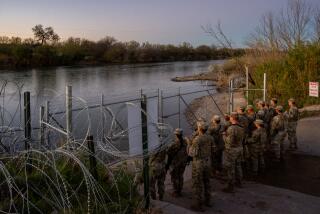Swiss Debate a Limit on Non-Swiss
- Share via
BERN, Switzerland — How many foreigners is enough? That is the question the Swiss must decide at the polls this month.
In Europe’s latest political controversy kindled by immigration, voters in this small, rich and landlocked country will be asked, via referendum, whether their constitution should be amended to limit the number of non-Swiss to 18% of the population.
“The number of foreigners has exploded in 10 years, without a real policy of integration being discussed,” complained Philipp Mueller, a member of the Radical Party who supervised the collection of 100,000 signatures to put the question on the Sept. 24 ballot.
Like Mueller’s party, most members of the Swiss political and economic establishment--including the leaders of the federal government, headquartered in Bern--have reacted with horror to his proposal.
“If this text is accepted, can we still look at ourselves in the mirror?” Ruth Meltzer, the Christian Democratic minister for justice and police, asked.
As the 1973 Italian film “Bread and Chocolate” chronicles, the once clannish and isolated Swiss have been trying for decades to come to terms with immigrants. The nearly 1.4 million foreigners now in the country, from taxi drivers and hotel concierges to Geneva-based financial wizards, furnish much of the labor and know-how that give Switzerland one of the world’s most comfortable and highly developed lifestyles.
Yet there are deep, enduring misgivings, especially in German-speaking areas. Last October, the populist right-wing People’s Party, led by Zurich millionaire Christoph Blocher, was the surprise winner in parliamentary elections, netting 22.6% of the vote, more than any of its competitors.
Last month, a People’s Party assembly bucked the recommendations of Blocher and his lieutenants and voted, 151 to 109, in favor of Mueller’s referendum.
The last straw for some Swiss was the arrival of large numbers of ethnic Albanians fleeing brutality in Yugoslavia’s Kosovo region last year. Already home to about 140,000 refugees from the former Yugoslav federation, Switzerland was faced with a sudden influx of 63,000 more. Today, many Swiss blame the Kosovo Albanians for increases in drug trafficking, prostitution and violent crime.
According to official data, the number of foreigners in Switzerland--19.3%--already exceeds the would-be immigrant limit. Mueller estimates that under the proposed ceiling, 100,000 people would have to be made to leave, chiefly through incentives for voluntary departure and tougher criteria for residence permits.
For the Radical Party maverick, not all foreigners are equal, however. Mueller is proposing special exemptions for scientists, business executives, artists and students.
Foes of a constitutional quota on immigrants cite both principle and pragmatism. A legally enshrined limit would be contrary to ideals of human rights and to accords with the European Union that mandate easier movement of labor, opponents say. Moreover, foreign-born workers now contribute twice as much to the national pension fund as they take out, and allowing immigrant ranks to grow might be the only way to keep the plan solvent.
Public Economy Minister Pascal Couchepin predicts a vote of 40% to 45% in favor of Mueller’s “xenophobic” idea--not the majority needed for passage, but proof of widespread concerns about the number of non-Swiss now living here. The Bern-based Federal Council, on which Couchepin and Meltzer sit, is countering with its own proposed law that would set no overall limit on foreigners but would restrict future immigration to qualified professionals and step up efforts to integrate newcomers.
More to Read
Sign up for Essential California
The most important California stories and recommendations in your inbox every morning.
You may occasionally receive promotional content from the Los Angeles Times.













